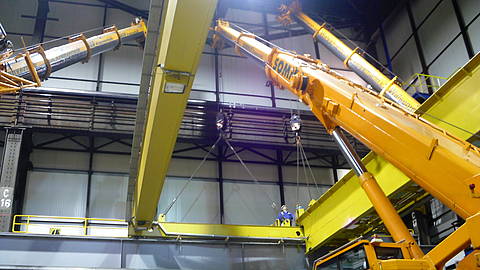
End-carriage replacement
on a semi-automated crane
Our client:
ArcelorMittal Bremen GmbH
The ArcelorMittal Bremen GmbH plant, where steel has been produced since 1957, is located on a seven square-kilometre site on the banks of the river Weser just north of the city of Bremen. As the second-largest employer in the region ArcelorMittal Bremen is equipped with high-tech production facilities capable of producing up to four million tonnes of raw steel a year. The company is run as a fully integrated metallurgical plant and all the different operations, from raw steel production through to thin-sheet processing, are combined on one site. ArcelorMittal Bremen is part of the world’s largest steel producing group ArcelorMittal, which has its headquarters in Luxembourg.
The commission
The rolling mills at ArcelorMittal Bremen GmbH produce steel plate to a precise thickness. The rollers are subjected to heavy wear and therefore require regular maintenance. The renovation of the roller components is carried out in the roll grinding shop. The contract involved replacing the end carriage on the grinding shop’s type-150 semi-automated crane. The remit was to complete the work in a single week-end in order to avoid having to shut down the plant.
Contract scope
The work was completed on the week-end of 24 and 25 March 2012. A competitor proposed using two 7 metre-high towers and hydraulics to carry out the operation. Following a detailed analysis of the site conditions, project manager Reiner Thamm from Blumenbecker Industrie-Service decided that in spite of the restricted space available, the job could be done using three mobile cranes. The cranes were positioned by the drivers so that no further manoeuvring was required. This allowed the work to be carried out within the allotted time using the mobile cranes and one cherry picker. The crane was measured by a surveying team from ArcelorMittal Bremen, who worked from Sunday morning through until lunchtime. After the end carriage had been aligned the survey team carried out a control measurement and confirmed that the operation had been a success. The holes for the shear pins were made using a special drilling machine. With the job done, crane 150 was able to start work again in the roll grinding shop as scheduled on 26 March.
